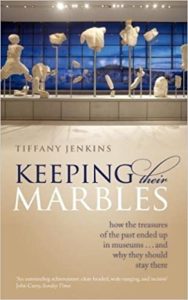[ad_1]
Why do you go to museums, and what do you hope will “occur” whilst you’re there, or after you’ve left? How do the objects inside a museum have an effect on your expertise, and the way do we all know {that a} given piece “belongs” there? Tiffany Jenkins, creator of Keeping Their Marbles, and EconTalk host Russ Roberts’ visitor in this episode, suggests there’s one thing transporting about visiting a museum, an expertise she particularly appreciates since COVID forbade such alternatives. To go to a museum, Jenkins hopes, offers one with an encounter with the previous and the individuals of the previous, noting that the issues that impress us in museums weren’t created by individuals to impress us.

A lot of the dialog focuses on the difficulty of artifact repatriation- the Elgin marbles on the British museum being the dominant instance from Jenkins’ guide. These sculptures, taken from the ruins of the Parthenon greater than 200 years in the past, reside half in London and half in Athens (at the Acropolis Museum). Whereas technically legally acquired, many questions stay as as to if the marbles ought to stay in Britain. What do you assume? How does the case of the Elgin marbles illuminate the bigger goal(s) of museums in society right now? We’d love to listen to your ideas.
1- What are the bases of the calls for to “return” artifacts such because the Elgin marbles to their nation of origin? What’s Jenkin’s argument towards returning them to Athens? What does she imply when she says, “objects do various things elsewhere?” Do you assume they need to be returned? Clarify.
2- Jenkins describes how Brits’ emotions had been combined on the time of the marbles’ acquisition. To what extent does it “matter” that the sculptures’ authorized settlement nonetheless exists? How does the “looting” of the French examine to that of the British (which Jenkins describes as “far more unintentional and haphazard and casual”)? How does the best way by which such artifacts are acquired have an effect on the argument for his or her repatriation?
3- Jenkins makes the daring prediction that the Elgin marbles won’t ever go away the British Museum, whereas Roberts suspects they are going to be returned, maybe changed by casts. (Roberts mentions his appreciation of the Burghers of Calais at Stanford, of which there are many copies.) How does it matter whether or not an exhibit options unique works versus reproductions? Couldn’t the exhibit on the British Museum be equally enthralling with casts or full-color reproductions of the marbles? Clarify.
4- What ought to be the position of museums right now? How do museums of the Enlightenment age examine to these of the current day, in response to Jenkins? How has the notion of accessibility particularly modified from the time of the Enlightenment until right now? Have museums turn out to be moralized? Do now we have roughly curiosity in different cultures right now than up to now? In what means(s)?
5- The dialog contains a great deal of dialogue about how the mission of museums has modified over time, and lots of modifications in the best way by which displays are offered have additionally occurred in an try and illuminate the “hidden histories” of the previous. (Roberts and Jenkins cite the National Museum of the American Indian as one such instance.) Are we at risk of “quarantining the previous relatively than exploring it,” as Jenkins suggests?
[ad_2]

